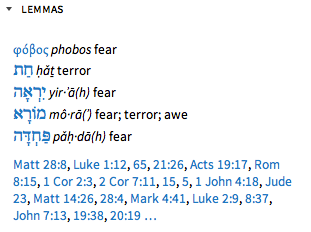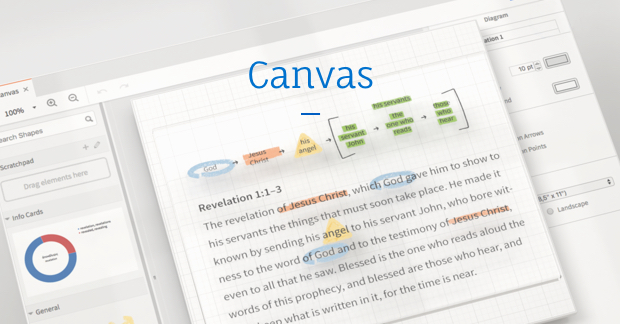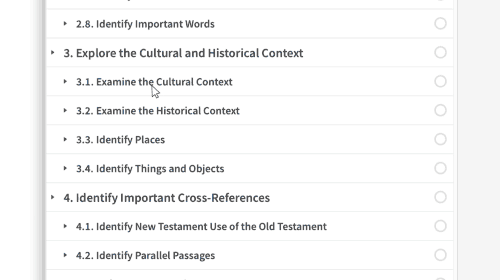I often meet people who simply can’t see the point of studying the Scriptures by looking into their original languages. Questions like, “Why do I need to study the Greek if I can read it plainly in the English already?” are commonplace, and I wanted to briefly address this issue.
First—I am not a Ph.D. I completed a lowly undergrad degree studying religion and history. I can read neither Greek nor Hebrew.
But I know how important it is to study the Holy Scriptures. I know the value of meditating on a verse, of letting the context and meaning of certain words shed light onto my understanding of Scripture.
And, thankfully, the Church guides us in our understanding of Holy Scripture. Through the Church, the Holy Spirit is guide and counselor regarding the truths we are to hold firm to in the Faith. But this doesn’t mean we can’t open our ears and soften our hearts to what God may want to speak to us through the Scriptures as we read them in private devotion.
It’s easy to forget that the Scriptures that we read today were not originally written in English. The authors of the Bible wrote in a language with a different lexicon—the words, phrases and imagery they chose had certain meanings in context, and sometimes it’s difficult for us to understand those meanings without looking at history and the original language itself.
This is precisely where the tools provided in Verbum become extraordinarily helpful.
Let’s say, for instance, I wanted to understand more about the concept of “fear” in the scriptures. I already know that “fear” in English has different connotations. I know that “the fear of the Lord” is different than something like a fear of spiders. But are there any other differences that I am missing? And what places in the Bible can I find these differences?
Let’s open up the Bible Sense Lexicon and see what happens.
Typing in fear I see five different Lemma’s (the dictionary form of the word) in addition to a list of scripture verses where these different instances of “fear” are used.
 Here I see that “fear” in the Scriptures can relate to at least five different senses. Clicking on one at random, mo-ra, I am brought to a Bible Word Study where I see this word used in even more detail.
Here I see that “fear” in the Scriptures can relate to at least five different senses. Clicking on one at random, mo-ra, I am brought to a Bible Word Study where I see this word used in even more detail.
Clicking on any of these parts of the graph bring me to all of the references in Scripture where “fear” was translated in that particular way.
When we scroll down again to look at the senses in the Bible Sense Lexicon, we see that the Hebrew language had many different permutations of what we translate as “fear.” What does this mean? Well, for one, when we come across the word “fear” in the Old Testament, we realize that such a word is packed with layers of meaning. Isaiah 8:13 for instance reads:
But the Lord of hosts, him you shall regard as holy; let him be your fear, and let him be your dread
The word for fear here is our headword, מוֹרָא (mora).
This means that in addition to fear meaning something akin to terror, the word holds meanings that include respect, reverence or awe. God is not just an entity to be terrified at; he is awesome, and worthy of reverence and praise. Just knowing something as simple as this disambiguates the text and helps us reach a clearer understanding of what the author had in mind when writing Scripture.
Tools like the Bible Sense Lexicon in conjunction with the Bible Word Study are, at least, fascinating tools that give you a glimpse into the history of language. But when used for study and personal devotion, you can use these tools to dig up deeper meanings in Scripture and get insight into Biblical concepts you might not have ever thought of otherwise.
The Bible Sense Lexicon is a great example of one of the tools that is continuing to grow inside of Verbum. Though it is now limited to nouns, soon you will be able to search other kinds of words, increasing your ability to study the original text even further. Upgrade today to get access to the Bible Sense Lexicon and other great resources inside Verbum (and hurry while you can still lock in a custom discount!)






The bible sense lexicon is only in the master and capstone packages. What about the rest of us?
The BSL is one of the (many) benefits of upgrading to a Master or Capstone library, so consider upgrading if you haven’t! (Again, we’re running a huge upgrade sale until the end of September, so now would be the time to do so.)
Otherwise, the Bible Word Study is still available in other base packages and is great for original language research as well.
You can also get the BSL by adding the Logos 5 Minimal Crossgrade to the package you already have. Make sure to be logged in when you check the price, so that you get credited for what you already own.
https://www.logos.com/product/28376/logos-5-minimal-crossgrade